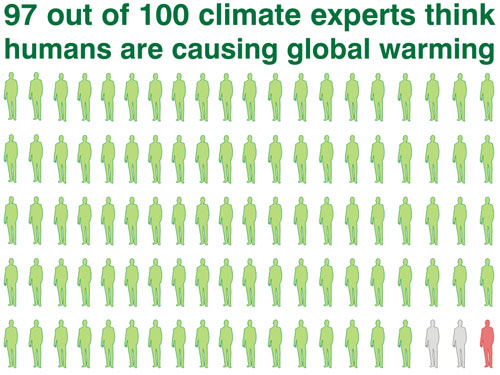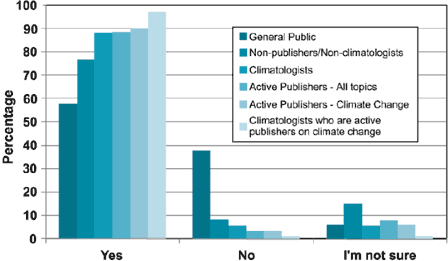Infographic: 97 out of 100 climate experts think humans are causing global warming
Posted on 11 May 2011 by John Cook
I was talking about climate to my dad last week (since the book launch, he will now talk to me about the subject) and I mentioned that 97% of climate scientists are convinced that humans are causing global warming. He registered great surprise at that statistic. "I thought it was more 50/50", he said. It made me realise just how good a job both the mainstream media and the fossil fuel funded disinformation campaign have done in confusing the public about the scientific consensus on global warming. At the same time, I was working on a consensus graphic (cribbed from the Guide to Skepticism) for a video presentation. So as a tool for anyone wishing to communicate the scientific consensus, I've added the following infographic to the Climate Graphics resource:
The 97% figure comes from two independent studies, each employing different methodologies. One study surveyed all climate scientists who have publicly signed declarations supporting or rejecting the consensus (Anderegg 2010). Another study directly asked earth scientists the following question "Do you think human activity is a significant contributing factor in changing mean global temperatures?" They found 97% of actively publishing climate scientists answered yes (Doran 2009). As "climate scientists actively publishing peer-reviewed research on climate change" doesn't really roll off the tongue, I abbreviated that down to "climate experts".
One feature of Doran's survey results is that while 97% of climate expert said "yes, humans are causing global warming", only 1% said "no, we're not". The other 2% were unsure:

Response to the survey question "Do you think human activity is a significant contributing factor in changing mean global temperatures?" (Doran 2009)
I've indicated the "I'm not sure" portion in the "97 out of 100 climate experts" infographic with grey colouring.































 Arguments
Arguments






























The question makes my head spin. It is loose enough for a goose. What it doesn't address is what is the specific cause and how much is man resonsible. Signicant is in the eye of the beholder. 0.1F would qualify for some.
So...... what climate scientist would think we have zero impact? Very few. We have bulldozed and burned well over 50% of the forests over the last 300 years, among other things. Of course the study doesn't go into the how much CO2 imapcts because they don't want the debate to start. It does not fit the yes/no simplicity.
I have seen quite a few of the 97%ers squirm a bit when asked how much, or whether they buy model projections. Many tend to take a "not sure how much" and "I'll wait before I endrose a model" type positions. That is what a real scientist would say. I remember seeing a few of them on a Weather Channel Special. Can you blame them? It's not warming now.
The guys who think we have it all figured out seem to be too young to know better. Science aint that easy
[JH] Unsubstantiaed global assertions are akin to sloganeering which is prohibited by the SkS Comment Policy. Please read the Comment Policy and comply with it.
97 of 100 is poppycock. It was 75 out of 77.
[JH] Any way you slice it, 97% equals 97 out of 100.
Back in 2011, DB noted on a cruzn246 post that "For the newcomers, cruzn246's last 40 comments here dating back to September 26 have all consisted of comments just like this: a derivative denial of the topic of the post, followed by other commenters chiming in to help correct the errors in his/her comments. Despite numerous pointers and links to sources, you persist in your misbeliefs. That is your right. But it is clear to all the position you come from."
Are you prepared to actually discuss and be prepared to back your assertions? If you are just criusing by making random uninformed statements, then I suggest you stop wasting peoples time. You could begin by telling which scientists have claimed to have it all figured out and what their ages are. (Experts are usually greybeards).
Your opening remarks are answered in opening really of the AR4 and 5 WG1 reports.Why dont you read them so you know what it is you are trying to critique> Eg see here. (CO2 1.68W/m2 versus -0.15 for landuse change). Quantified enough for you? Modellers are also actually very clear on what they can or cannot predict. Checked to see what these are or are you content repeating a straw man argument from some denier site?
[JH] If cruzn426's future posts are like his last two, they will be promptly be deleted for violating the SkS Comment Policy.
If science was based on popular opinion, the earth would still be flat - and at the center of the universe. A two-question, vaguely worded survey of scientists, regardless of their qualifications, should not be tossed around like its scientific evidence of anything.
The difference, NAFFFA (@215), is that realizing the world is a sphere is a a result of a scientific process. It was the result of careful observation. Same with the heliocentricity. Casual observation might make you think the sun revolves around the world, but it was careful scientific research that gave us the real answer.
Climate science is the same. We now have 150+ years of careful research showing us that CO2 is the biggest control knob managing the temperature of the earth. That nearly all researchers agree with this position is not surprising, given the overwhelming body of research.
NotAFossil:
The first step in writing a scientific paper or theses is the literature review. You are unlikely to advance the science if you don't know what it is. Knowledgable scientists base their opinions on the published literature, as well as their own work.
Follow the links to see what the quoted studies say. Then also follow this link to the paper that was based on "The Consensus Project" work (menu item at the top of the SkS page), where the "survey" is a survey of the literature - first by looking at abstracts, then by getting feedback from the authors of papers.
The result? The scientific literature on "global climate change" and "global warming" (the keywords in the search) is also almost universally in support of the idea that humans are responsible for over half of the recent warming.
This is scientific evidence that knowledgable, informed scientists are largely in agreement on the basics, which refutes the alternative argument that there is still significant scientific debate on whether or not humans are having an effect.
Not to pile on too much, but not looking at public opinion but at informed opinion. Informed opinion since 2nd Century BC was that world was round.
We now have 3 different studies with different methodologies coming to same conclusion as to the state of scientific consensus. (the lastest published result is this one which is survey of publications).
It is absolutely given that a consensus does not make a theory correct. However, it is a myth that there is no scientific consensus. For policy makers, going with the consensus is the only rational choice. If you were ill, would you be like this guy? It's not like there is any other credible theory of climate.
NotAFossil @215 starts by saying, "If science was based on popular opinion, the earth would still be flat - and at the center of the universe."
When you first arrive at SkS, you see a button "Newcomers Start Here". If you follow it, it provides you with (among other things) a paragraph on good places for newcomers to start, including "Warming Indicators", "10 Human Fingerprints on Climate Change", "empirical evidence that humans are causing global warming", and then in the following paragraph, "Global Warming in a Nutshell" and "The History of Climate Science". The last of those also appears as a button on the home page, as does "The Big Picture". Of these, only the last mentions consensus at all, and that only the consensus of economists. Rather than focussing on the consensus, they all focus on the emperical evidence which shows global warming to be real, human caused, and potentially catastrophic.
The core of this website are the 176 rebutals to pseudo-skeptical myths about global warming. Of those, only 14 (8%) discuss the consensus. The rest primarilly focus on the scientific evidence for AGW (there are a few dealing with discussions of fraud). Of course, that 8% does not represent the level of SkS interest in the consensus. Rather, it reflects the level of pseudo-skeptic misinformation trying to persuade the uninformed that no consensus exists, even though it clearly does. (Note, due to an idiosyncrasy of the SkS search engine, it will search draft blog posts in addition to ones actually published. At least 1 of the 14 rebutals above is still in draft form, so is not actually part of the 176 published arguments. Ergo, 8% is an overstatement of the actual figure.)
From this, it is very clear that SkS realizes that it is not the consensus but the scientific evidence itself that is the real reason for accepting AGW. They discuss the consensus only to show the false claim by pseudo-skeptics that there is no consensus, that climate scientists are heavilly divided about AGW, is in fact a false claim.
Despite this, we repeatedly get pseudo-skeptics like NotAFossil who come in with their little slogans as if SkS ever argued that science is settled by consensus. They show by the way the focus on the consensus issue that, not only are they arguing a strawman, but they are actively avoiding engaging with the evidence that is so copiously presented elsewhere on SkS.